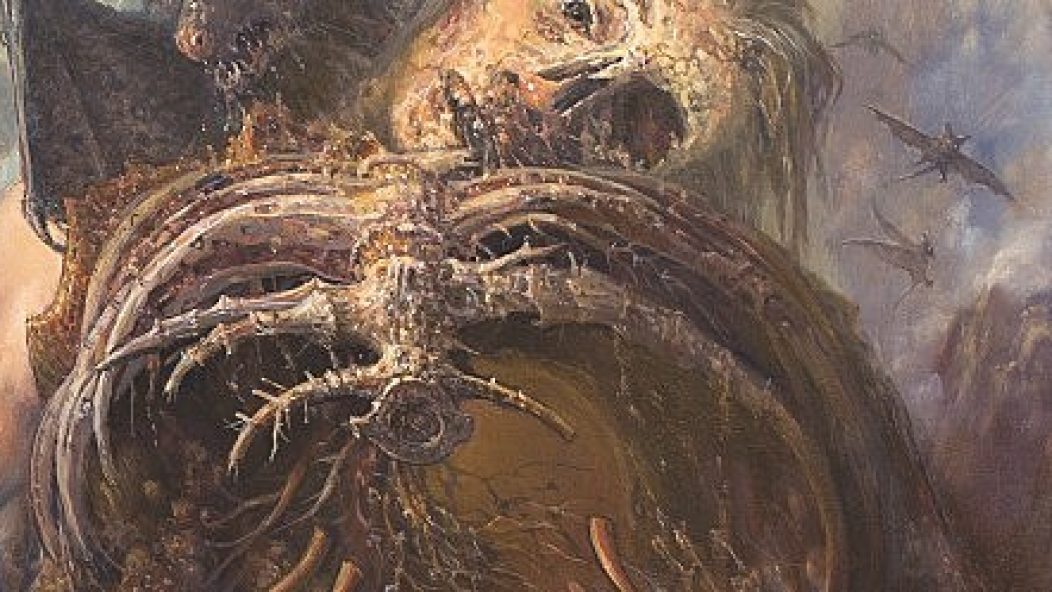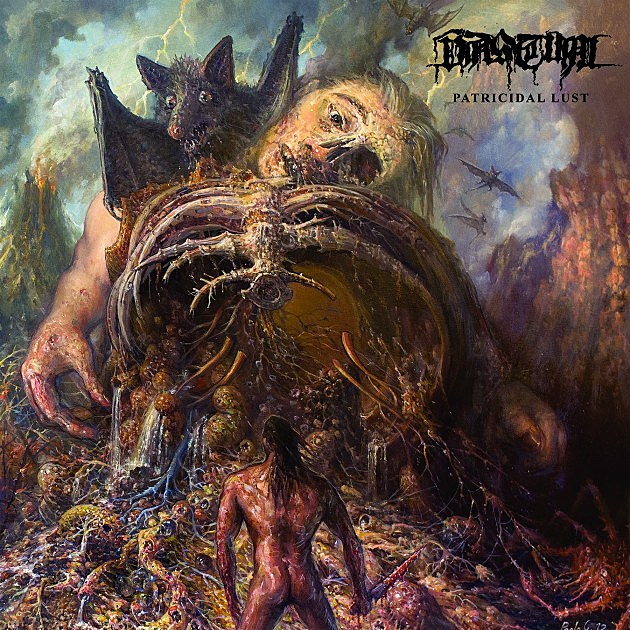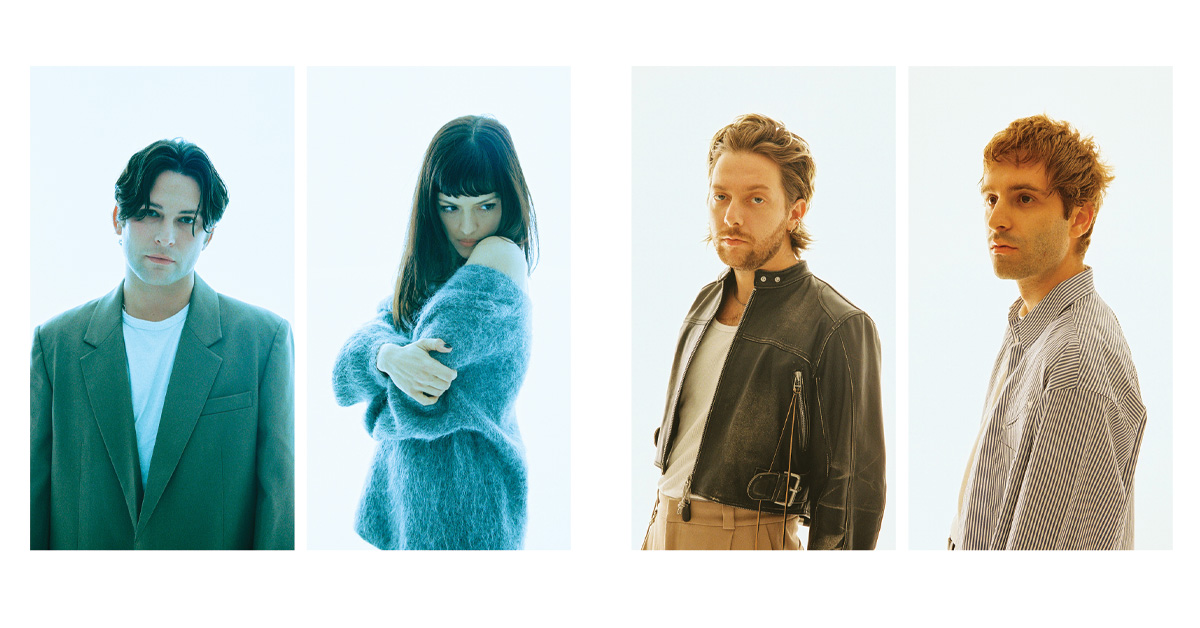
Full album stream & interview: Vastum - Patricidal Lust

…
…
San Francisco’s Vastum burst onto the scene in 2011 in a very 1991 manner: they put out a demo tape. Carnal Law may have lacked a professional press campaign and a record label, but it was pretty clearly among the cream of the old-school death metal crop. It explored some unusual lyrical ground for the style, and it brilliantly utilized the vocal interplay between Acephalix frontman Daniel Butler and underground superwoman Leila Abdul-Rauf. Most importantly, the riffs were tasty as hell.
Two years and a contract with 20 Buck Spin later, Vastum are about to unleash Patricidal Lust on a death metal audience that’s paying much closer attention. Luckily, it lives up to any heightened expectations. The riffs and vocals are still merciless, and the inimitable cover artist Paolo Girardi turns in what might be his finest piece of the year (with all due respect to Inquisition and Power Trip). Perhaps the most interesting thing about Patricidal Lust is how deep into sexual taboo the lyrics are willing to go. Butler and Abdul-Rauf’s perspectives here are somewhat more observational and less direct than the work of, say, Ash Pool or Leviathan, but somehow the distance makes the words more incisive.
Butler, Abdul-Rauf and bassist Luca Indrio took the time to answer some questions about the darkness of eroticism, the persistence of old-school death metal, and the making of Patricidal Lust, which we’re exclusively streaming in full above. Patricidal Lust comes out on November 12 via 20 Buck Spin.
…
What were the two years between Carnal Law and Patricidal Lust like for you as a band?
Daniel Butler: Mixed. Lots of good shows and good times playing with friends’ bands and out-of-town bands, but also a number of difficulties in terms of this recording and band turnover. There are lots of good metal bands out there (and in the Northwest US), so this has also made it an exciting time.
Leila Abdul-Rauf: The band changed and grew tremendously in that period, but also experienced a lot of turmoil. RD, our first drummer, left the band shortly after Carnal Law was released, and Sam Foster (Saros, Weakling) was our fill-in drummer for our first tour. Adam Perry eventually stepped in as our permanent drummer and can be heard on Patricidal Lust. In the middle of recording this album, our producer and friend Jeff Davis was tragically killed in a motorcycle accident. Jeff’s death was a huge loss to us and the local metal/punk community, and due to grief and practical reasons, it took us months to even broach the half-finished recording. We were lucky to even salvage the recording from Jeff’s computer with the help of his friend Jimmy Crucifix.
When Greg Wilkinson at Earhammer Studios took over production, Jeff’s files were in such a state of disarray that it took tedious months to get them in sound condition. Greg did a hell of a job with this, and his experienced production skills with the heaviness factor eventually saved the record, exactly one year later. Within that difficult year, in late 2012, Adam told us he was moving to Los Angeles, and Kyle decided to leave the band due to lack of interest and wishing to focus on other projects. If we hadn’t been able to salvage Jeff’s recording, there would have been no existing band to re-record the album and no record of the line-up with Kyle and Adam. Currently we are working with a new drummer and guitarist whose identities will be revealed once we are closer to being ready to perform live again.
Luca Indrio: Those years were hard. Jeff died a year after Carnal Law came out. We were really close to him and his wife Nikki. We recorded with him for years, for almost all the Acephalix songs as well as Vastum and my other band Necrot. He died while we were recording Patricidal Lust and it was shocking for all of us. Kyle and Adam also left the band and it took us some time to get things back together. Things are looking good now.
Did having 20 Buck Spin behind the new record change the writing and recording process from the demo?
Leila: I don’t think so. 20 Buck Spin has been extremely supportive of us throughout the making of both albums. That said, any changes in our sound or process from Carnal Law to Patricidal Lust were attributable to our intrinsic growth as a band regardless of label affiliation.
Luca: It didn’t. We would be playing the same music with or without a record label.
Typically when it comes to sexual depravity in lyrics, black metal bands have sort of cornered the market on serious, real-life darkness, while death metal bands have often been stuck riffing on post-“Fucked With A Knife” tropes. Patricidal Lust is certainly sexually explicit, but it’s darker than just about anything I’ve heard. What was the impetus behind taking this lyrical approach?
Daniel: I tend to distinguish between erotic and sexual, “sexual” being an invention of late nineteenth-century human sciences. So there is a kind of dialectic between the sexual and the erotic in that we are sexed through language and culture, that we are in a sense violated by language, involuntarily submitted to it, which is an intrusion, a penetration; but that there is an excess that is not contained by the sexual and this excess is the erotic. This is horrifying beyond representation. It is the nameless and faceless dread that trumps any kind of horror one can experience directly. Only an indirect approach, an oblique one, captures this kind of horror — and even then this horror is only captured in the negative, in something that is not, something repudiated and impossible to integrate, something that resists symbolization. I think that Lori Bravo evokes this phenomenon in some of her lyrics; there are explicitly sexual themes that cannot be contained by the sexual and spill over into the bizarre, the unknowable, the mystical, and the erotic.
Leila: For me, images of perversion are expressed not in isolation but are embedded within a larger context of an experience that is indescribable, confusing, or difficult to put into words. These images are just hints, or flashes of the larger horror moving invisibly in the darkness.
Paolo Girardi’s cover art seems to complement the themes and the atmosphere as well. Were you in contact during one another’s creative process?
Luca: I was the one talking with him because I speak Italian as Paolo does. We gave him some directions, Dan sent him some lyrics and concepts, and I did translations between them. Paolo sounded very excited about drawing for us because he likes our style and he managed to understand the concept behind the album well. He really did a great painting. Dan also drew an alternative cover for the LP that follows up better our first album Carnal Law; I am equally stoked on both covers.
Daniel: We were in contact with him. He depicted the scene of a patricide, making it more Oedipal than I expected (a good thing).
Old-school death metal seems creatively healthy as ever despite an ever-surging number of bands playing it. What’s so timeless about this style of music?
Luca: What makes it timeless are the tones and the attitude. There will be for always people like us that dedicate their fingers to it.
Daniel: I don’t know that it is timeless as a genre. I think certain bands are timeless in the sense that they lead one to have a kind of timeless aesthetic experience, that they evoke self-shattering or transcendent feelings in the listener. When I listen to old Anathema, Nuclear Death, or mid-period Num Skull, each band evokes a very different affective state for me, but the feelings are always quite primitive, quite oceanic or explosive. Of current bands, Grave Miasma is undoubtedly the one who has achieved timeless status in my mind.
Leila: I think old-school death metal by definition is intentionally dated. Newer bands recreating the aesthetic wish to relive the dark, ugly, and primitive feelings that the early albums evoked. I think what all of my favorite early death albums have in common besides memorable riffs/songwriting and raw production, is that they stand alone in their sound, and did something different with the genre to make it memorable. That’s what makes a band a classic. In my eyes, a genre itself can’t be timeless; it’s the particular band or recording that is.
…










